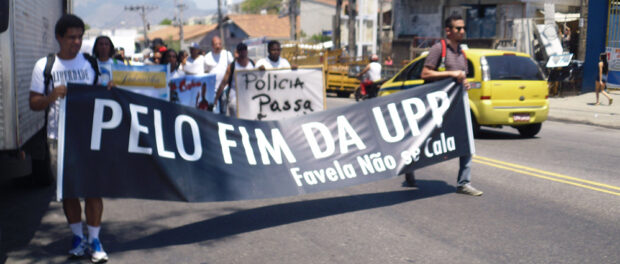
Two young men are reported to have been killed on Sunday in Fazendinha, Complexo do Alemão, North Zone—only one day after activists expressed their frustration with the area’s excessive violence in a March for Peace demonstration on the morning of Saturday October 11.
Community members claim the young men were not involved in any criminal activity. Since the end of the 2014 FIFA World Cup, at least six members of the community have been killed in confrontations with the Military Police and shootouts have occurred intermittently everywhere in the community, leaving dozens injured.
The March for Peace, organized by several community leaders, kicked off at about 10:30 am on Saturday in Praça do Terço in Nova Brasília and ended before noon at Avenida Central instead of Praça do Intercontinental in Vila Cruzeiro, Penha, as was originally planned, due to the day’s scorching heat. About 50 supporters attended the walk.
The event was meant to highlight the raging violence and police brutality in several favelas, particularly Complexo do Alemão and Vila Cruzeiro.
Thainã de Medeiros, one of the walk’s organizers and resident of Vila Cruzeiro, said: “Noticing that in August there was so much [violence] going on, in September I began to record in my calendar the days that had shootouts. Every day has been marked.”
Organizers began the march with a roll call. Names of victims were called and the crowd responded “presente” (“present”) in unison after each name. The roll call ended with “favela” to which the crowd roared: “present!” Roll calls of this kind are done to signify that the victims of violence have a voice through the living.
From the starting point, the crowd walked down the entrance of Nova Brasilia to Rua Tarare, all the way to Avenida Central. Throughout the march, demonstrators handed out flyers and white roses to passersby. All the while, Pacifying Police Unit (UPP) officers guarded the streets to secure demonstrators during the walk.
Attendants were dressed in white and carried signs denouncing the “UPP without social projects” as mere “[political] makeup,” and questioned if the pacification of favelas was actually “peace or fiction?” Some explicitly demanded the “end of the UPP.” Demonstrators also carried a large coffin symbolizing the many fatalities suffered by favela residents.
Throughout the walk, leaders took turns on a megaphone to motivate the crowd with chants and songs such the ‘Rap da Felicidade‘: “Eu só quero é ser feliz, andar tranquilamente na favela onde eu nasci” (All I want is to be happy, walk in tranquillity in the favela where I was born). Demonstrators made about five stops during the walk to reach out to residents on the street for their support and to let victims and relatives of victims speak out.
Among the speakers was Ana Paula Gomes de Oliveira, resident of Manguinhos, also in Rio’s North Zone. She is the mother of Jonatha de Oliveira, a 19-year-old, who was shot in the back and killed by UPP officers in the community last May. Now, she only wants justice.
“Instead of placing armed cops in favelas to kill our sons, why not actually take a good look at our communities that have suffered so much and are in need of other things,” she said. “We need health care, quality education, recreational activities for the youth, culture. Our favela is hungry for that. We are thirsty for these things.”
Fatima Santos, another resident of Manguinhos, also spoke at the event. Her son was beaten and choked to death by UPP officers last year. She joined the walk to raise awareness and hopefully prevent any more deaths.
“There have been five deaths [in Manguinhos] already, and they were all people we knew, residents who were not doing anything wrong—nothing that could justify what the UPP did,” Santos said. “Taking a life can’t be justified. They should arrest people and take them to the police station to check if the person actually did anything. They’d rather kill than arrest.”
Saturday’s walk is the third event since the World Cup that community leaders have organized to raise awareness of the violence in favelas. In August, a Twitter campaign reached a reported 500,000 people worldwide and another Caminhada pela Paz (March for Peace) brought forth discussions about the stark increase in insecurity after the FIFA event.
Mariluce Souza, one of the event’s organizers, said she was disappointed with the low turnout. Online support for these initiatives is strong, but when it comes to taking to the streets, attendance is poor. Souza said showing strength in numbers on the street is important. The police feel like they rule the community because people fear going outside, but protesting on the streets is the first step toward changing that, she said.



